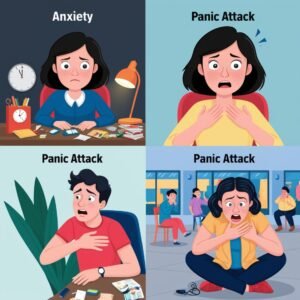How to Tell if Shortness of Breath is from Anxiety? Key Symptoms of Anxiety-Induced Shortness of Breath
Experiencing shortness of breath can be alarming, especially when it’s sudden and unexplained. It can be caused by a variety of factors, including physical health issues like asthma or heart conditions. However, shortness of breath is also a common symptom of anxiety. Understanding whether your shortness of breath is anxiety-induced can help you better manage the situation and take appropriate steps to ease your discomfort.
What is Anxiety-Induced Shortness of Breath?
When you’re anxious, your body goes into a “fight or flight” mode. This is a natural response to perceived danger, even if the threat isn’t real. Your body starts producing stress hormones like adrenaline, which can cause physiological changes—including faster breathing. This rapid, shallow breathing can lead to the sensation of shortness of breath, even if you’re physically healthy.
Key Symptoms of Anxiety-Induced Shortness of Breath
Here are some common signs that shortness of breath may be related to anxiety:
1. Occurs Suddenly During a Stressful Situation
Anxiety-induced shortness of breath often appears during moments of high stress or anxiety. It may happen suddenly when you feel overwhelmed, nervous, or under pressure.
2. Breathing Feels Rapid and Shallow
Anxiety can cause hyperventilation, which is rapid, shallow breathing. You may feel like you’re not getting enough air, even though you’re taking in more oxygen than your body needs.
3. Associated with Other Anxiety Symptoms
Shortness of breath from anxiety is typically accompanied by other physical symptoms such as:
- Racing heart
- Dizziness or lightheadedness
- Tightness in the chest
- Sweating
- Shaking or trembling
- Nausea
4. Comes and Goes in Waves
Unlike shortness of breath caused by a respiratory or cardiac condition, anxiety-induced shortness of breath may come in waves. It tends to peak during periods of high stress and may subside when you begin to relax.
5. Improves with Relaxation Techniques
If your shortness of breath improves with deep breathing exercises, meditation, or calming activities, it’s a strong indicator that anxiety is the cause. Relaxation techniques help counter the body’s “fight or flight” response, slowing down your breathing and heart rate.
6. No Physical Cause Found After Medical Evaluation
If you’ve had medical evaluations for shortness of breath and no physical issues were found (such as asthma or a heart problem), anxiety could be the underlying cause. Many people with anxiety experience physical symptoms that have no apparent medical explanation.
Why Does Anxiety Cause Shortness of Breath?
Anxiety triggers the body’s autonomic nervous system, preparing you to either “fight” or “flee” from danger. This stress response alters your breathing pattern to allow more oxygen into your muscles for quick action. However, when there’s no actual physical threat, this change in breathing can feel overwhelming, leading to sensations of breathlessness.
How to Manage Anxiety-Induced Shortness of Breath
If you suspect anxiety is causing your shortness of breath, there are several strategies to help alleviate the symptom:
1. Practice Deep Breathing
Deep, slow breathing can help counteract the rapid, shallow breaths caused by anxiety. Try inhaling slowly through your nose for four seconds, holding your breath for a few seconds, and then exhaling slowly through your mouth.
2. Grounding Techniques
Grounding techniques, such as focusing on your surroundings or engaging your senses, can help pull your mind away from anxiety and refocus on the present moment. This can help reduce your anxiety levels and ease your breathing.
3. Progressive Muscle Relaxation
This involves tensing and then relaxing different muscle groups in your body. It can help you focus on physical sensations other than your breathlessness and may help calm your body’s anxiety response.
4. Seek Professional Help
If anxiety-induced shortness of breath is a frequent issue, talking to a therapist or counselor can help you manage it. Cognitive-behavioral therapy (CBT) and other techniques can be very effective for anxiety management.
When to See a Doctor
While anxiety-induced shortness of breath is common, it’s important to rule out other potential causes. Seek medical advice if:
- Your shortness of breath is persistent.
- You have additional symptoms like chest pain, fainting, or a blue tint to your lips or skin.
- You have a history of asthma, heart conditions, or other respiratory issues.
Anxiety attacks can be overwhelming, leaving people feeling paralyzed and frightened. For many, the sudden surge of fear and anxiety can last anywhere from minutes to hours. But can anxiety attacks persist for days? This is a question that concerns many individuals who suffer from anxiety disorders. In this comprehensive guide, we will address this query and explore other related topics about anxiety and panic attacks, their symptoms, how long they last, and how to manage them effectively.
Introduction to Anxiety Attacks
Anxiety is a natural response to stress, and while mild anxiety can help prepare you for a challenge, prolonged or severe anxiety can lead to debilitating anxiety attacks. Millions of people around the world struggle with these attacks, making it essential to understand the key aspects of this condition and how to manage it effectively.
What Is an Anxiety Attack?
An anxiety attack is an intense episode of fear or distress. It often comes on suddenly and may include physical symptoms such as shortness of breath, racing heart, dizziness, or a feeling of impending doom. Unlike generalized anxiety, an anxiety attack is more acute and can severely disrupt daily life.
Can Anxiety Attacks Last for Days? Here is the Answer
In most cases, anxiety attacks last anywhere from 10 minutes to an hour. However, the feelings of anxiety can linger even after the peak of the attack subsides. While rare, it’s not impossible for a person to feel anxiety-related symptoms for several days. This extended experience is usually a sign of chronic anxiety or an underlying mental health condition such as Generalized Anxiety Disorder (GAD). If an anxiety attack seems to persist for days, it’s important to seek professional medical advice to rule out other health conditions.
How Long Does an Anxiety Attack Last?
Anxiety attacks typically last from 10 to 30 minutes, but the duration can vary from person to person. In some cases, an anxiety attack may last for up to an hour. After the attack, residual anxiety may remain for a while longer, sometimes leading to fatigue or exhaustion. It’s crucial to recognize that the length and intensity of an anxiety attack can depend on various factors, such as the individual’s stress level, triggers, and coping mechanisms.
Can Anxiety Attacks Last for Days?
Yes, anxiety attacks can last for days, though this is less common. When people experience prolonged anxiety attacks, it may feel as though they are in a continuous state of heightened anxiety. However, what may be occurring is an extended period of high anxiety, during which the person has multiple anxiety attacks. The sensation of continuous anxiety can cause confusion and make it seem like the attack itself is ongoing.
How Long Can a Panic Attack Last?
A panic attack is different from an anxiety attack in that it usually involves a more intense burst of fear and physical symptoms. Panic attacks tend to peak quickly, often within 10 minutes, but the after-effects can linger for hours. Some individuals may experience several panic attacks in succession, making it feel like the panic episode is longer. However, individual panic attacks generally don’t last longer than an hour.
Anxiety vs. Panic Attacks: Key Differences
Anxiety and panic attacks share similar symptoms but are distinct in their onset, intensity, and duration. Anxiety attacks usually build up gradually, while panic attacks come on suddenly and are more intense. Panic attacks are often associated with physical symptoms like chest pain, which can be so severe that people mistake them for heart attacks. Anxiety attacks, on the other hand, tend to have a slower build-up and are more tied to worrying thoughts than physical distress.
What Causes Anxiety Attacks to Persist?
Several factors can cause anxiety attacks to persist for days, including:

- Chronic stress: Prolonged exposure to stress without effective coping mechanisms can lead to ongoing anxiety.
- Underlying health conditions: Disorders like GAD or PTSD can cause prolonged anxiety.
- Lack of treatment: Without proper medical intervention, anxiety attacks can recur frequently, leading to a cycle of ongoing anxiety.
- Substance use: Certain substances, such as caffeine or stimulants, can exacerbate anxiety and prolong its symptoms.
Symptoms of Anxiety Attacks
The symptoms of an anxiety attack can vary but often include:
- Rapid heartbeat
- Shortness of breath
- Sweating
- Trembling or shaking
- Nausea or dizziness
- Chills or hot flashes
- Feeling of choking or smothering
- Fear of losing control
10. Symptoms of Panic Attacks
Panic attacks, while similar to anxiety attacks, come with some distinct symptoms, including:
- Chest pain
- A sense of impending doom
- Severe dizziness or lightheadedness
- Tingling or numbness in extremities
- Feeling detached from reality (derealization)
How to Stop an Anxiety Attack
Stopping an anxiety attack can feel impossible in the moment, but there are effective techniques to manage and reduce symptoms:
- Deep breathing: Focus on slow, deep breaths to regulate heart rate and reduce panic.
- Mindfulness: Ground yourself in the present moment by paying attention to your senses.
- Physical activity: Engage in light exercise to release tension.
- Progressive muscle relaxation: Tense and release each muscle group to calm the body.
How to Differentiate Between Anxiety and Panic Attacks
Distinguishing between anxiety and panic attacks can be challenging, but understanding their key differences can help:
- Onset: Anxiety attacks build up gradually, while panic attacks appear suddenly.
- Duration: Panic attacks are short-lived, while anxiety attacks may last longer.
- Intensity: Panic attacks are typically more intense and frightening than anxiety attacks.
- Physical Symptoms: Panic attacks often mimic heart attacks, while anxiety attacks involve milder physical symptoms.
Long-Term Effects of Untreated Anxiety Attacks
If anxiety attacks are not treated, they can lead to a range of long-term effects, including:
- Chronic stress: Untreated anxiety can lead to ongoing stress, which negatively affects physical health.
- Mental health issues: Prolonged anxiety attacks can contribute to depression, substance abuse, and other mental health disorders.
- Physical health problems: Chronic anxiety can lead to heart disease, high blood pressure, and weakened immune system.
FAQs: “How Long Do Anxiety Attacks Last?”
Q: How long does an anxiety attack last on average?
A: Typically, anxiety attacks last 10 to 30 minutes.
Q: Can anxiety attacks last longer than an hour?
A: While it’s uncommon, anxiety attacks can last longer, especially if triggered by prolonged stress.
Q: What’s the difference between a panic attack and an anxiety attack?
A: Panic attacks are sudden and intense, while anxiety attacks build gradually and last longer.
Q: Can anxiety attacks happen daily?
A: Yes, individuals with chronic anxiety disorders may experience anxiety attacks daily or even multiple times a day.
Q: Can anxiety attacks cause physical harm?
A: While anxiety attacks are distressing, they typically do not cause physical harm.
Q: When should I see a doctor about anxiety attacks?
A: If anxiety attacks interfere with your daily life or last for extended periods, it’s important to seek professional help.
Conclusion
Anxiety attacks are a challenging and often debilitating experience, but understanding how long they last and how to manage them can help individuals regain control over their mental well-being. While anxiety attacks generally don’t last for days, lingering symptoms can persist without proper intervention. Seeking medical advice, practicing mindfulness, and using relaxation techniques can significantly reduce the frequency and intensity of these attacks.











